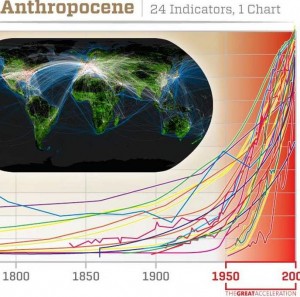 We aren’t simply living in a new geological age. We’re creating it. It’s called the Anthropocene. The literal meaning of the word would be “the era of man.” That’s our home, and it represents a mere blip of 170,000 years in geological time. Though the word hasn’t been officially accepted into the Geological Time Scale, I’d venture to suggest it’s here to stay. The word packs a lot more punch that, say, Paleocene or Holocene, because it’s loaded with a sense of moral urgency. It doesn’t simply describe us. It implicates us.
We aren’t simply living in a new geological age. We’re creating it. It’s called the Anthropocene. The literal meaning of the word would be “the era of man.” That’s our home, and it represents a mere blip of 170,000 years in geological time. Though the word hasn’t been officially accepted into the Geological Time Scale, I’d venture to suggest it’s here to stay. The word packs a lot more punch that, say, Paleocene or Holocene, because it’s loaded with a sense of moral urgency. It doesn’t simply describe us. It implicates us.
We are profoundly altering the planet’s ecosystem. The impact we’re having is manifold. The climate change debate revolves around the effect of dramatically rising levels of carbon dioxide in the atmosphere, as a result of increased population but mostly as a result of greenhouse gases we’re releasing through combustion of fossil fuel. It’s part of the crisis of the Anthropocene. Hurricane Sandy’s nightmarish effect on New York City converted Mayor Bloomberg into a global warming activist — and no wonder. 2012 was the hottest year on record. It’s simply one chilling example of what’s been happening for years, the outcome of rising temperatures as a result of atmospheric change.
Its effect isn’t simply on the human community. The earth’s rising temperature threatens to wipe out an entire ecosystem, the coral reefs that protect and nurture scores of aquatic life forms. Beyond the reefs, marine phytoplankton is also endangered: they account for nearly half the Earth’s total photosynthetic biomass. In the past 50 years, that population of plankton has dropped by nearly half, destroyed by rising water temperatures. The outcome of these changes is incalculable. Perhaps more concerning to us is that these destroyed ecosystems are likely precursors of what may well happen to us humans and the life on the entire planet. Just like the canary sent in a coal mine after an explosion to see it if can survive the devastating gases that mine disasters can create. Well the coral reefs and the marine phytoplankton are failing the test.
And our impact isn’t limited to the atmosphere. The Economist pointed out, a while back, our impact has also been profound on the “nitrogen cycle.” We are extracting large amounts of nitrogen from the atmosphere, converting it into fertilizer, and then spread excessive overabundance into the soil — making it available to plants and animals that need it. Yet the surplus is then washed into our rivers. At the end of its journey, it flows through river deltas, killing life forms and creating coastal “dead zones” through algae blooms.
A large part of being a morally responsible human being now means that each of us needs to first recognize the significance of the Anthropocene and its environmental impact, and then make choices aligned with an attempt to respect the ecosystem as much as possible. It’s a tricky thing for those of us in the U.S. We could reduce coal burning for example, and then watch as China steps up its own emissions by an order of magnitude. To properly address the problem will require an ongoing effort to convene a coordinated global response of all mankind in which all participants recognize the unprecedented way in which human behavior is reshaping and threatening the planet.
To survive, our collective consciousness must also evolve. Spiritually we must learn to seriously care for “the other” in our global village. Intellectually we must listen to knowledge and data that makes us uncomfortable and which can seriously inconvenience all our lives. But that’s the only way we can leave our children and their children the healthy planet we inherited. Do our kids deserve less? It’s past time any of us hearing this story can afford to do nothing. Tomorrow morning will be a brand new day. The sun will come up in the sequence for all of us round the world. Let’s keep it that way. There’s much work to be done.